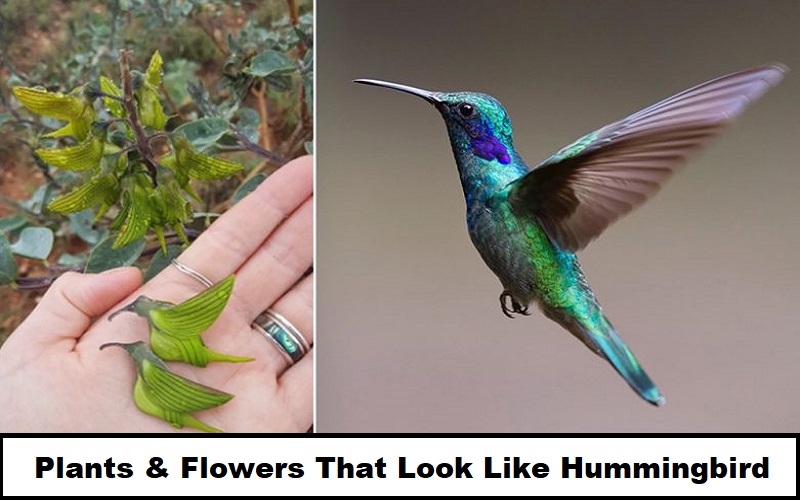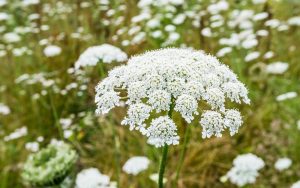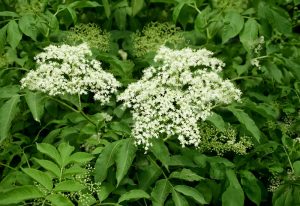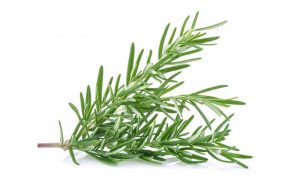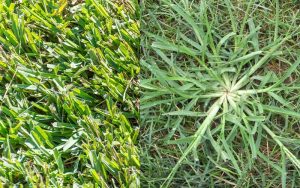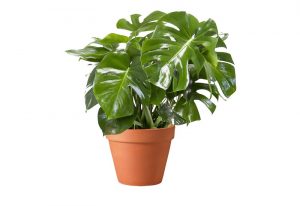In nature, imitation is often more than condescending. Which is vital and most significant. This very important survival technique is used by everything. From very little birds to worms, and it is important. Yet, it is with a flower that has a strong similarity to a hummingbird. It illustrates that this basic survival strategy.
Moreover, it utilizes everything for all intents and purposes. Small birds to worms, and it is significant in a large manner. That important evolution may become far more clear. This demonstrates how copying in nature is sometimes a lot more than condescending. Which is crucial, or so they imagined.
Crotalaria cunninghamii got named after the well-known Australian botanist Allan Cunningham. Which is particularly noteworthy. Their sap has allegedly been used to treat eye infections by Australians. Implying that these flowers may hold further surprises for nature nerds. On the internet, or so they thought. So in this article, there is a lot of talking about Plants and Flowers That Look Like Hummingbirds.
A Plant That Looks Like Hummingbirds
Crotalaria cunninghamii is, for all intents and purposes, a short-lived, tall plant. It is also in a significant way. It is also known as the Green Bird Flower, which is significant. A little shrub with green blooms that resemble a hummingbird. They are only joined by the beak to the center type of stem of the flower head, which is rather significant.
Flower induction occurs from winter through spring, and sometimes in September. In its kind of natural environment, which is very significant. The bloom is a club-shaped capsule, about 4-5 cm long, that inflates, is stiff, and velvety.
An upright and hairy stem with a pretty open patterned crown. Robust branches, and spherical dull green leaves. That demonstrates how a tiny shrub with definitely green blooms. That actually mimics a hummingbird. These are actually connected only by beak to the center for all intents. Purposes the stem of the flower head in a subtle way. They are kind of flowers that look Like Hummingbirds.
They are available in central Australia. They have an upright and hairy stem with a particularly open patterned crown. Robust branches, and spherical dull very green leaves. As well as a tiny shrub with sort of green blooms that resemble a hummingbird. They connect only by beak to the center particularly the stem of the flower head. Which is quite significant. They are also quite easy to hatch. They will grow well in most moderate to hot environments. Implying that crotalaria cunninghamii is a short-lived plant. A tall plant in a usually large way.
Check Out Top 3 Flowers Seeds For your Garden:
No products found.
5 Plants & Flowers That Look Like Hummingbirds
Now let’s talk about 5 flowers that look like Hummingbirds
1. Crotalaria Cunninghamii:
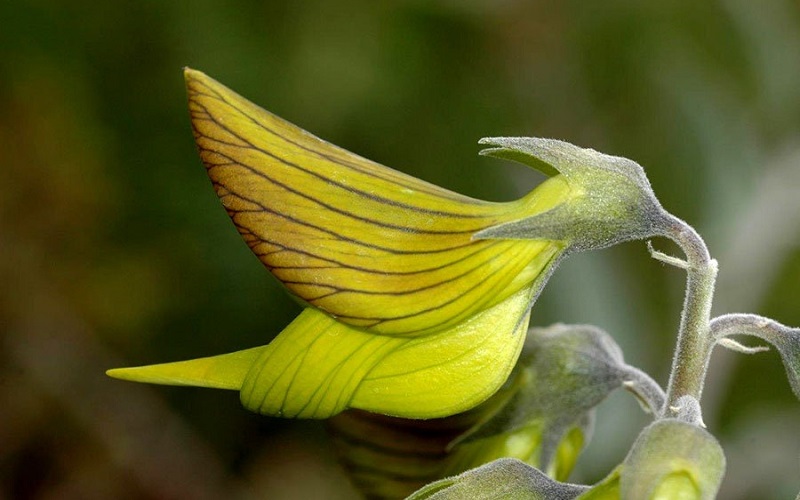
Crotalaria cunninghamii, sometimes known as Green Bird Flower. It’s a plant that grows wild in the United States. Crotalaria cunninghamii is a tiny shrub species in the Fabaceae family. This fascinating plant is only found in Northwest and North Central Australia. It has beautiful yellow-green pea-like blooms that seem like flying birds. Looks like birds with their beaks attached to the plant. The petals surrounded thin black lines. It produces velvety-textured, strong, club-shaped fruits. Which is average around 5cm in length. This plant loves to colonize unstable sand dune settings. It flourishes in coastal locations and Mulga settlements as well.
2. Salvia regla:
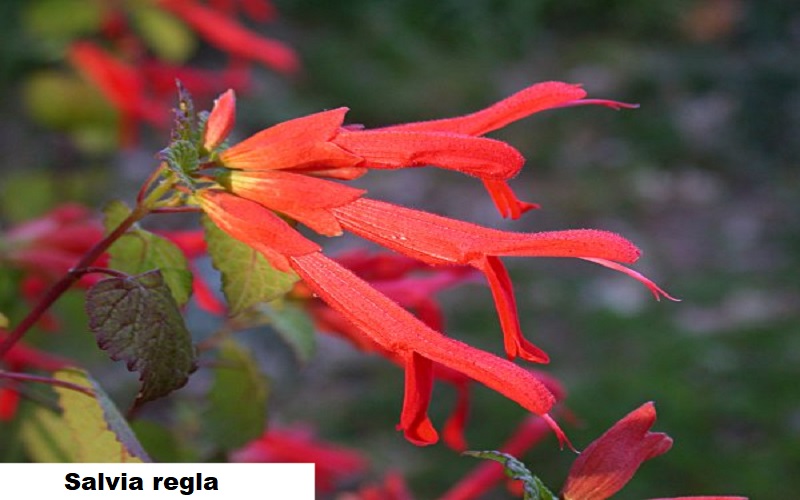
Salvia regla also known as Mountain sage. These are native to the Chisos Mountains. In west Texas as well as a large part of Mexico. It means the “Queen of the Chisos Mountains.” It is the hummingbird’s very favorite food. It plates for migratory birds along the Texas flyway. Salvia regla is a deciduous shrub that may reach a height of 6 feet and a spread of 4–5 feet. Its towering, erect stems provide it with a majestic appearance.
Deltoid leaves are mistletoe-green, veined, and 1 inch broad and long. The flower tube is one inch long. Along with a one-inch signal-red calyx that is chartreuse on the underside and turned to the light.
3. Red columbine:
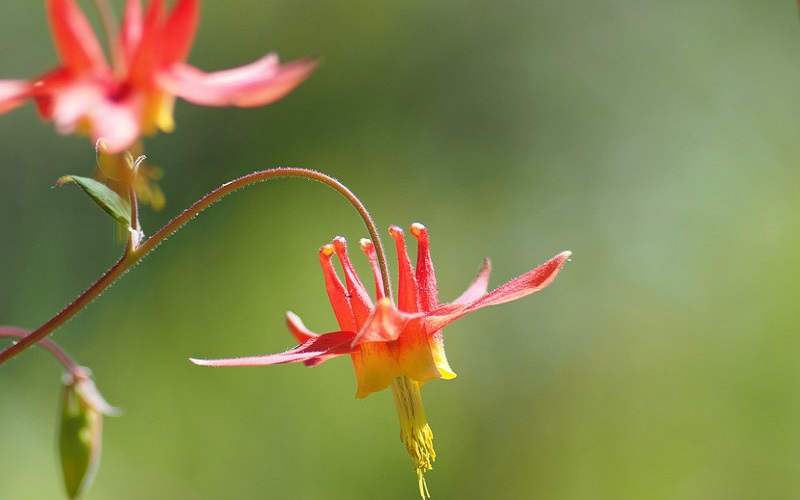
This spectacular hilly wildflower has gorgeous, hanging, bell-like flowers. It is with backward-pointing tubes. Like garden Columbines. These tubes, or spurs, contain nectar. They attract protracted insects and hummingbirds. That adapts to consume the delectable fluid. Native Americans used to have put pulverized seeds on the palms of men as a love charm. It is a perennial herbaceous indigenous to eastern North America’s forests. Rocky slopes, valued for their red and yellow blossoms.
4. Astragaluscoccineus:
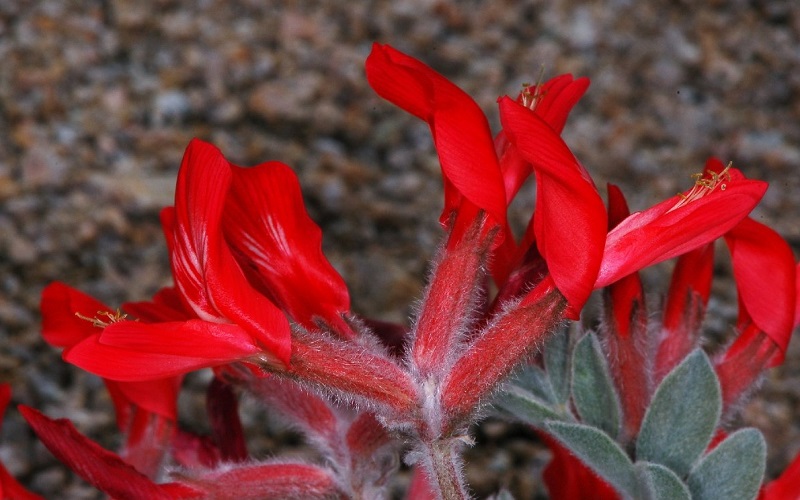
Astragaluscoccineus is a gloopy perennial plant. It has a dense covering of white hairs. Another word is “milkvetch,”. They are considering descriptors for less venomous. More, less immediately toxic species. The plant distinguishes from other milkvetches by its massive. But vivid red blossoms. The genus name, Astragalus, is a Greek word for the anklebone, which relates to the fruits in some way. Coccineus is Latin for “scarlet” or “bright red,” referring to the beautiful red flowers.
5. Crocosmia ‘Lucifer:
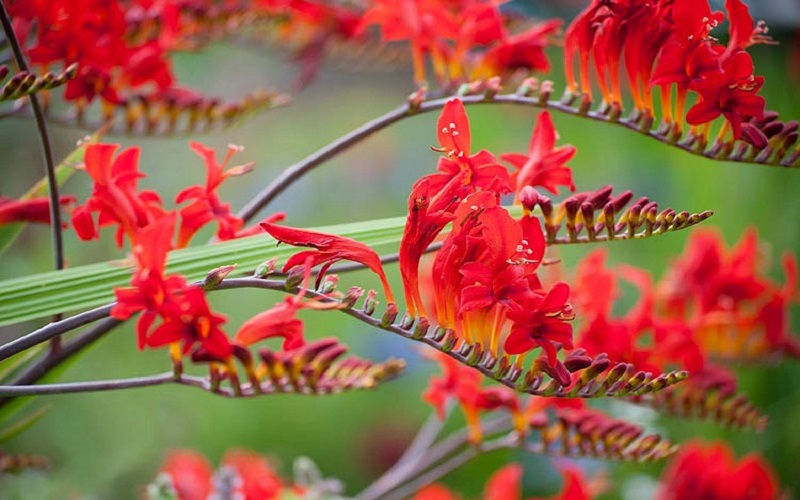
Montbretia and Crocosmia are common names for this plant. ‘Lucifer,’ one of the hardiest kinds, adds a tropical taste to northern gardens. Beautiful fiery red flowers occur in rows on wiry, arched stems. That is ideal for cutting beginning in June. They last until early October in certain locations. Even when the plants aren’t in flower, the wide, sword-like leaves of Crocosmia are attractive. From a design standpoint, these are excellent. Also for adding a spiky textural element to the surroundings.
How to grow Flowers That look like Hummingbirds
Crotalaria cunninghamii seeds are available for sale. Green bird flower is pretty common in horticulture in warm places. It requires well-drained soils & loves a location in full sun. It suites to chilly areas & gets destroyed by frost.
Green Bird Flowers are in Mulga settlements. Also on unstable sand dunes, especially on dune crests. The green bird flower blooms from January to April in Perth. Sometimes longer in its natural environment. It follows velvety, club-shaped seed pods about four to five centimeters in length. They have a bloom in the shape of a hummingbird.
Some useful tips can come in handy. Green Bird Flowers are cultivated from seed. That has been before immersed in boiling water and sowed in October, or from grafts. Although it is a warm-weather plant. It will flourish in cooler climes and is best grown in the spring, summer, and fall. This plant thrives in a sunny spot with well-drained sandy soil. They are natural slow-release fertilizers.
They are also drought-resistant, but not cold resistant. Nonetheless, these plants are subject to molds and rotting throughout the winter. Nonetheless, spring pruning and an extra application of native slow-release fertilizer. It will aid in rerecording for the warm season. Also retaining its compact structure.
The flower’s color is unappealing. But this is a unique and stunning greenhouse plant. It has a smooth velvety pubescence that covers all surfaces in a uniform. A glaucous tone immediately caught people’s eye. It is indigenous to the arid and desert regions of northwest and central Australia. From Shark’s Bay to the Gulf of Carpentaria, flowers are blooming on sandy slopes. They southward across central Australia to Spencer’s Gulf.
Indoors, green bird flowers can be cultivated. Bring the plant inside till spring if you live in an area. These experiences cold temperatures throughout winter. This shrub prefers full sun and well-drained soil, although it is drought-tolerant. The Green Birdflower plant’s seeds are there on the internet for sale.
What Flowers Do Hummingbirds like
The nectar-holding capacity of red tubular flowers is generally the highest. In a subtle manner, are very appealing to hummingbirds. Perennials such as columbines, bee balms, lupines, daylilies, and biennials. Hollyhocks and foxgloves are among them. Impatiens, cleomes, and petunias are examples of annuals.
You may also put out some gorgeous scarlet-colored flowers to attract Hummingbirds. Species that are native to the area, such as trumpet honeysuckle, bee balm, and hummingbird sage. It has a higher nectar content than hybrids and exotics. Native red or sort of orange tubular blossoms. As well as nectar-rich native plants. They are also planted to attract hummingbirds. It demonstrates how contrary to popular belief. You can also generally put out some very bright reddish color flowers. To attract Hummingbirds.
Now let’s see the top 10 flowers that Hummingbirds like,
- Bee Balm (Monardadidyma): They have these full spikes and spherical shapes. Perennial bee balm makes it a fascinating and attractive plant. In the landscape, as well as a hummingbird magnet.
- Salvia (Salvia spp.): The Salvia genus contains a large number of annual. Perennial species within the mint family. Flowers of perennial salvia emerge in mid-summer. They continue to bloom until late summer. They are also very appealing to hummingbirds.
- Bleeding Heart (Lamprocapnosspectabilis): Bleeding hearts are lovely perennials with graceful foliage. Hanging heart-shaped blossoms in white or pink. They thrive in colder weather and light shade. The leaves may turn yellow. But, die during the warm months, but the plants regrow each spring.
- Cardinal Flower (Lobelia cardinalis): Lobelia is a perennial plant of the Lobelia genus. They are a part of blooming plants. The cardinal flower has long spires of blooms up to four feet tall. Its deep crimson flowers fashions. Making it attractive as both a decorative plant and a food source for hummingbirds.
- Zinnia (Zinnia Spp.): Zinnias are easy to cultivate. Annual flowers with vibrant bloom colors. It attracts hummingbirds and other pollinators.
- Lupine (Lupinus x hybridus): Although wild lupines do not survive in home gardens. Many hybrids produce that make superb if short-lived, garden perennials. This early-blooming flower attracts spring hummingbirds. Before other flowers open and insect food sources depletes.
- Aquilegia spp.(Columbine): The genus Aquilegia has many species. They are utilized as garden perennials. Aquilegia canadensis, sometimes known as columbine, is an example. But, the many cultivars and hybrids generated from these species. They are much more significant.
- Petunia (Petunia Group): Petunias are a favorite attractor flower. Since they are simple to cultivate and priced. The flower grows best in bright sunshine. They bloom often, offering enough nectar for hummingbirds to feed on.
- Trumpet Creeper (Campsisradicans): This plant is also known as trumpet vine. Also can be called hummingbird vine. This plant has the ability to take over a tiny area and grow on a variety of surfaces. It has thick foliage and long, tubular flowers that hummingbirds love.
- Butterfly Bush (Buddleia davidii): This deciduous blooming shrub attracts butterflies. It also attracts hummingbirds. The dense, elongated clusters of blooms will bloom often from mid-summer through October.
Frequently Asked Questions (FAQ)
Can you cultivate Crotalaria cunninghamii inside of your house?
Yes, you can. It may be grown both inside and outdoors in temperate climes. It needs a very cold temperature to survive.
Crotalaria Cunninghamii is venomous?
Yes, it is toxic. All portions of the plant are hazardous, even when it is desiccated. A very little dose of a dried plant can cause serious liver damage.
Can Crotalaria Cunninghamii be cultivated from seed?
Yes, Crotalaria Cunninghamii can be cultivated from seed. Crotalaria cunninghamii seeds germinate in 21-30 days on average. Sow Crotalaria cunninghamii seeds 2mm deep in a well-drained seed sowing mix at around 22°C. Crotalaria cunninghamii seeds should be soaked in warm water that is changed daily.
Where can Crotalaria cunninghamii be found?
It can be found in Western Australia. Very dispersed over the northern part. on drainage lines and sand dunes.
Conclusion:
Flowers are important in nature for a variety of reasons. Insects, birds, animals, and humans are all fed by flowers. They are also natural therapies for humans and other creatures. Aiding plant reproduction by attracting outside pollinators. Plants would be greener without flowers, and the world would be a duller place.
When people got to know that some Plants and Flowers Look Like Hummingbirds, everyone was taken aback when they discovered that. An amazing Australian plant produces blossoms that resembled hummingbirds. The details were so evident that it’s tough to imagine this was a mistake. The flower piqued the interest of plant enthusiasts. Also with many claims that there is more to this plant than we know.
